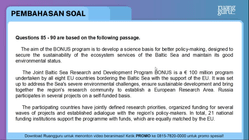Iklan
Pertanyaan
Questions 85 - 90 are based on the following passage.
The aim of the BONUS program is to develop a science basis for better policy-making, designed to secure the sustainability of the ecosystem services of the Baltic Sea and maintain its good environmental status.
The Joint Baltic Sea Research and Development Program BONUS is a € 100 million program undertaken by all eight EU countries bordering the Baltic Sea with the support of the EU. It was set up to address the Sea's severe environmental challenges, ensure sustainable development and bring together the region's research community to establish a European Research Area. Russia participates in several projects on a self-funded basis.
The participating countries have jointly defined research priorities, organized funding for several waves of projects and established adialogue with the region's policy-makers. In total, 21 national funding institutions support the programme with funds, which are equally matched by the EU.
BONUS focuses on the sustainable management of the Baltic Sea, which is a crucial asset not just in terms of its environmental significance, but importantly also for many sectors of the region's economy. Everything that happens in the sea is experienced by the people, the countries and the economies that surround it-particularly so in the case of the Baltic Sea, which is semi-enclosed.
Two calls for BONUS project proposals have been concluded and a third call will be published in 2015. The first wave of BONUS projects is already under way. Interesting descriptions of these projects can be found on the BONUS web site.
One of the programme's main strengths derives from its two-pronged approach: BONUS funds both research and innovation activities that target the challenges facing the Baltic Sea. This work generates both knowledge and solutions to specific problems.
To illustrate, Kononen points to a raft of projects focusing on eutrophication, the phenomenon caused by an excess of nutrients such as nitrates and phosphates. These can tip the ecological balance in an aquatic system, endangering many species of flora and fauna. BONUS funds researchdedicated to tackling nutrients from agricultural soils as well as three innovation projects that develop specific related technologies. All BONUS projects are encouraged to communicate and engage with a wide variety of stakeholders.
Kononen reports that BONUS has established itself as a respected contributor to policy discussions, alongside important organisations such as the Baltic Marine Environment Protection Commission HELCOM and the Council of the Baltic Sea States.
The programme's success reflects how mindsets have changed over the past decades, she notes, adding that there was a time when environmental and economic priorities where viewed as conflicting. "But now," she says, "we see that the way towards the future is really in sustainable development. We have to support the economy for the benefit of the citizens while making sure that the environment stays in a good status, securing its services for future generations."
(Source: http://ec.europa.eu)
Which of the following indicates the author's bias in the passage?
Which of the following indicates the author's bias in the passage?
The BONUS program focuses on the sustainable management of Baltic Sea.
This work generates both knowledge and solutions to specific problems.
21 national funding institutions support the program with funds.
We have to support the economy for the benefit of the citizens.
The program's success reflects the change of our mindsets.
Iklan
N. Puspita
Master Teacher
2
5.0 (3 rating)
Iklan
Pertanyaan serupa
RUANGGURU HQ
Jl. Dr. Saharjo No.161, Manggarai Selatan, Tebet, Kota Jakarta Selatan, Daerah Khusus Ibukota Jakarta 12860
Produk Ruangguru
Bantuan & Panduan
Hubungi Kami
©2026 Ruangguru. All Rights Reserved PT. Ruang Raya Indonesia

















